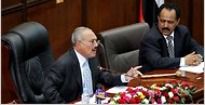Yemen's Prez Won't Seek Reelection
President Ali Abdullah Saleh of Yemen said on Wednesday that he would not run for re-election when his term ends in 2013, a stunning concessions to protesters that marked yet another reverberation of the anger that has rocked the Arab World.
Mr. Saleh, an American ally who has been in office for 32 years, also said that his eldest son, Ahmed, who heads the elite Republican Guard, would not seek the presidency, as government opponents had feared.
The Yemeni leader made the announcement a day before planned protests in Sana, the capital, and other districts in Yemen. Last week, the country witnessed the largest demonstrations of Mr. Saleh’s tenure, and organizers said they expected a higher turnout on Thursday. The president’s announcement came a day after President Hosni Mubarak, in the face of a protest that gathered hundreds of thousands in downtown Cairo, declared that he would step down in September after finishing his term.
“No extension, no inheritance, no resetting the clock,” Mr. Saleh said on Wednesday, during a joint session of Parliament and another legislative body that was boycotted by the opposition. “I present these concessions in the interests of the country. The interests of the country come before our personal interests.”
The president also urged the opposition to cancel their planned demonstrations and invited them to resume a dialogue that collapsed last October when authorities announced plans to hold parliamentary elections in April before opposing political camps finished their deliberations.
In another concession, Mr. Saleh said he would delay these elections until better voter records were compiled, an opposition demand.
The concessions were met with skepticism by opposition lawmakers, an eclectic bloc dominated by Islamists. Several said they would go ahead with their plans for protests, voicing fears that the promises might never materialize.
In 2005, Mr. Saleh announced that he would not run for another term, only to change his mind a year later. He was elected in 2006 to a seven-year term.
“We lost confidence in the president,” said Zaid al-Shami, a lawmaker and opposition figure. “It is not the first time he promises something that he ends up not honoring.”
Unlike Tunisia and Egypt, where protesters were calling for the ouster of their leaders, Yemenis are asking for reforms and a smooth transition of power through elections. But the concession itself marked another acceleration in the momentum that has gathered across North Africa and the Middle East for deep, even radical change in a longstanding regional order backed by the United States.
The Arab world’s poorest country, Yemen is troubled by a rebellion in the north and a struggle for secession in the south. And in recent years, an affiliate of Al Qaeda has turned parts of the country into a refuge beyond the state’s reach. A remarkably high proportion of citizens are armed.
Click here to read more.


